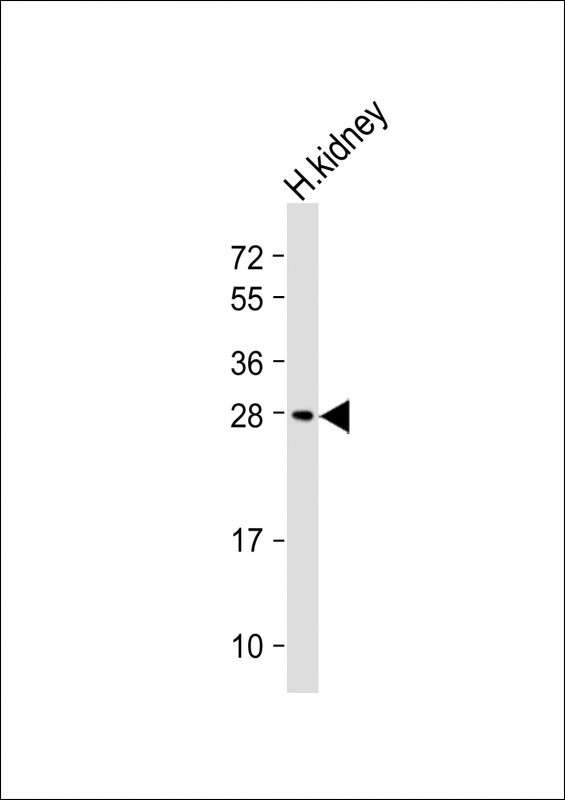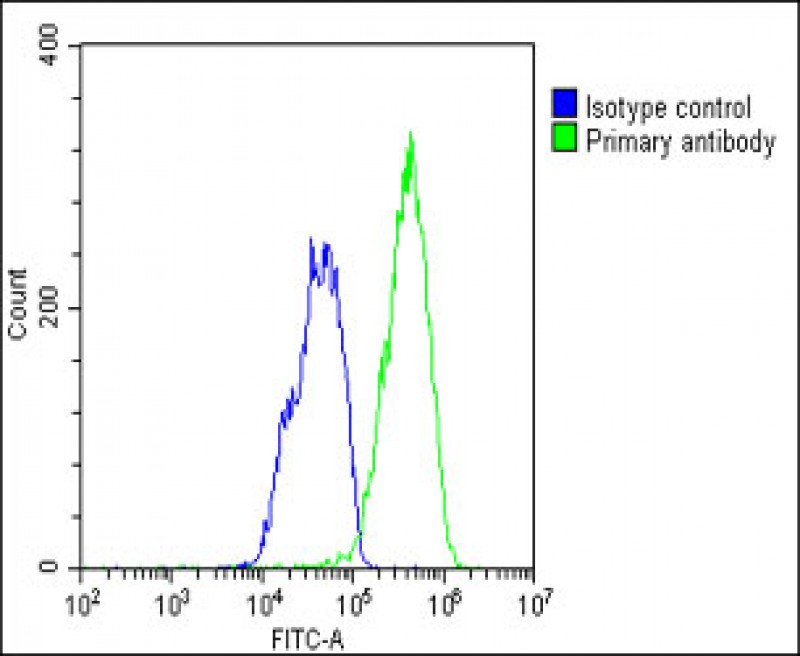


| WB | 咨询技术 | Human,Mouse,Rat |
| IF | 咨询技术 | Human,Mouse,Rat |
| IHC | 1/250 | Human,Mouse,Rat |
| ICC | 技术咨询 | Human,Mouse,Rat |
| FCM | 1/25 | Human,Mouse,Rat |
| Elisa | 咨询技术 | Human,Mouse,Rat |
| Aliases | E3 ubiquitin-protein ligase RNF4, 632-, RING finger protein 4, Small nuclear ring finger protein, Protein SNURF, RNF4, SNURF |
| Entrez GeneID | 6047 |
| WB Predicted band size | 21.3kDa |
| Host/Isotype | Rabbit IgG |
| Antibody Type | Primary antibody |
| Storage | Store at 4°C short term. Aliquot and store at -20°C long term. Avoid freeze/thaw cycles. |
| Species Reactivity | Human |
| Immunogen | This RNF4 antibody is generated from rabbits immunized with a KLH conjugated synthetic peptide between 95-123 amino acids from the C-terminal region of human RNF4. |
| Formulation | Purified antibody in PBS with 0.05% sodium azide. |
+ +
以下是3篇关于RNF4抗体的代表性文献,供参考:
---
1. **文献名称**: *RNF4 is a poly-SUMO-specific E3 ubiquitin ligase required for arsenic-induced PML degradation*
**作者**: Tatham, M.H., et al.
**摘要**: 研究揭示了RNF4通过识别多聚SUMO化修饰的底物(如PML蛋白),介导其泛素化及蛋白酶体降解。文中使用RNF4抗体进行免疫印迹(Western blot)和免疫荧光实验,证实了砷剂处理下RNF4对PML核体的调控作用。
---
2. **文献名称**: *The SUMO-targeted ubiquitin ligase RNF4 regulates the localization and function of the oncogenic protein kinase SRPK1*
**作者**: Yin, Y., et al.
**摘要**: 该研究探讨RNF4通过靶向SRPK1激酶的SUMO化修饰,调控其亚细胞定位及致癌功能。实验中利用RNF4特异性抗体进行免疫共沉淀(Co-IP),证明了RNF4与SRPK1的相互作用及泛素化调控机制。
---
3. **文献名称**: *RNF4-dependent oncogene activation by protein stabilization*
**作者**: Prajapati, S., et al.
**摘要**: 研究指出RNF4通过拮抗泛素化降解途径稳定某些致癌蛋白(如c-Myc),促进肿瘤发生。文中采用RNF4敲除细胞系,结合RNF4抗体的染色质免疫沉淀(ChIP)分析,揭示了RNF4在转录调控中的新功能。
---
**备注**:以上文献为示例,实际引用时建议通过PubMed或学术数据库检索最新研究,并核实抗体货号及实验细节。如需具体实验用途(如WB/IHC等),可进一步筛选针对性文献。
The RNF4 antibody is a key tool for studying the Ring Finger Protein 4 (RNF4), an E3 ubiquitin ligase involved in the ubiquitin-proteasome system. RNF4 plays a critical role in maintaining genomic stability by targeting SUMOylated proteins for proteasomal degradation, a process essential for DNA repair, transcriptional regulation, and stress response. It acts as a STUbL (SUMO-Targeted Ubiquitin Ligase), recognizing poly-SUMO chains on substrates and tagging them with ubiquitin to signal degradation. Dysregulation of RNF4 has been linked to cancer, neurodegenerative diseases, and developmental disorders, making it a focus of therapeutic research.
RNF4 antibodies are widely used in techniques like Western blotting, immunoprecipitation, and immunofluorescence to detect protein expression, localization, and interaction partners. These antibodies are typically raised against specific epitopes of human or murine RNF4 and vary in clonality (monoclonal/polyoclonal) and host species (rabbit, mouse). Researchers rely on validated RNF4 antibodies to explore its role in pathways like homologous recombination repair, p53 signaling, and cell cycle control. Commercial availability from multiple suppliers ensures accessibility, but validation for species cross-reactivity, post-translational modification sensitivity, and application-specific performance remains crucial for experimental accuracy.
×